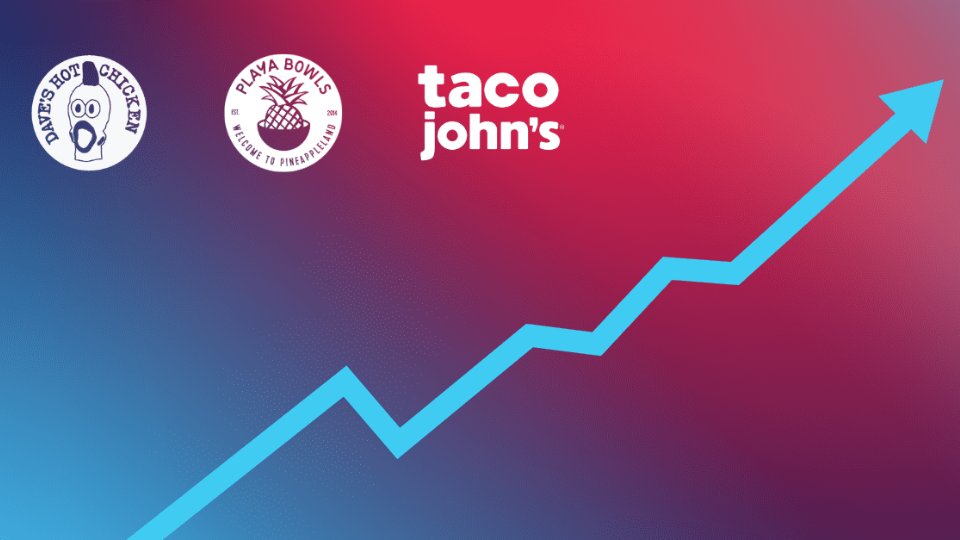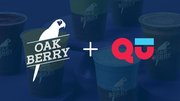Operations
3 Ways Unified Data Drives ROI & Value for Enterprise Restaurant Brands
Discover how leading brands use restaurant operations, data, and analytics to boost ROI, streamline performance, and scale unit-level profitability.

June 27, 2025
At this year’s Restaurant Leadership Conference (RLC), our Innovation Forum brought together top restaurant executives to explore how data and AI are driving real value—starting with the metrics that matter most: unit-level economics (ULEs). Industry leaders dug into how brands can unlock profitability at scale, increasing ULEs, by focusing on foundational drivers like labor, food cost, equipment performance, and throughput.
Moderated by Qu’s Chief Product Officer Darien Bates, the panel featured executives from three fast-growing enterprise brands:
- John Cappasola, CEO of Playa Bowls
- Heather Leed Neary, CEO of Taco John’s
- Carolyne Canady, CDO of Dave’s Hot Chicken
Their discussion explored how data and real-time insights are becoming core to modern restaurant leadership—not just in the back of house, but across the entire business.
Here are 3 ways restaurant leaders are using data to drive ROI and value—and the insights that stood out most from the discussion:
1. Speed: Scaling Fast & Smart with Predictive Systems
For fast-growing brands like Dave’s Hot Chicken, speed isn’t just a business goal—it’s a competitive advantage. But rapid expansion doesn’t happen without systems that can keep up.
 When you think about opening 150 stores in a year, it’s about speed. And the way you go fast is by putting the systems and the foundation in place to do it. That’s what we did early—we put a lot of data-driven systems in place so we could go fast.”- Carolyne Canady, CDO, Dave’s Hot Chicken
When you think about opening 150 stores in a year, it’s about speed. And the way you go fast is by putting the systems and the foundation in place to do it. That’s what we did early—we put a lot of data-driven systems in place so we could go fast.”- Carolyne Canady, CDO, Dave’s Hot Chicken
That foundation includes predictive operations. Whether it’s planning a real estate pipeline or rebalancing a labor model mid-shift, the ability to harness real-time data enables operators to anticipate needs, respond faster, and reduce friction. When every decision is backed by timely, unified insights, speed becomes sustainable and scalable.
This focus on speed wasn’t just a brand-specific story—it reflected a broader theme across the Innovation Forum. As unit growth accelerates industry-wide, leaders emphasized the need for predictive systems that can streamline operations at scale.
The consensus? Speed must be supported by a stable, real-time structure. Without the right data and systems in place, fast becomes fragile. But with real-time insights and operational guardrails, brands can move quickly—and confidently—into new markets, new formats, and new opportunities.
2. Stakeholder Alignment: Improving Operational Consistency
For Playa Bowls, alignment is key—across systems, stakeholders, and insights. CEO John Cappasola emphasized how the ability to unify data and operations enables consistent growth and protects the brand’s unique identity.
Franchisee alignment plays a critical role in Playa’s success. With strong operational intelligence and unified data across locations, the brand can ensure franchisees are equipped to deliver the same high-quality experience—no matter where they’re located. This includes consistent training, real-time visibility into performance, and systems that scale efficiently without creating confusion.
 We’re in 1,300-square-foot shops, without walk-ins in some cases. When you have big tubs of acai filling a small cooler, you need technology that helps you predict demand and avoid waste.”- John Cappasola, CEO, Playa Bowls
We’re in 1,300-square-foot shops, without walk-ins in some cases. When you have big tubs of acai filling a small cooler, you need technology that helps you predict demand and avoid waste.”- John Cappasola, CEO, Playa Bowls
Whether it’s forecasting production, managing energy usage, or syncing up on promotions, centralized data ensures Playa can support unit-level profitability while staying true to the brand’s standards and guest experience. And at the core of all of this? A shared data foundation that keeps franchisees aligned with the brand—and with one another.
“Understanding where seasonality is hitting, as an example, and making sure our distributors and supplier partners are aligned, is a critical piece. There are great tools out there to help you stay ahead, predict it, and even create action from those predictions.”
3. Managing Change: Empowering Teams with a Modern Platform
Change is inevitable—but when managed well, it becomes a key driver of ROI. Heather Neary, CEO, shared how Taco John’s is navigating legacy transitions, shifting franchisee mindsets, and reinforcing operational standards to fuel growth and consistency.
 We’re not cutting labor—we’re moving it to where it matters more. When someone leaves the drive-thru and hops back on the line, things start flowing faster.” - Heather Leed Neary, CEO, Taco John’s
We’re not cutting labor—we’re moving it to where it matters more. When someone leaves the drive-thru and hops back on the line, things start flowing faster.” - Heather Leed Neary, CEO, Taco John’s
Taco John’s uses Qu’s unified ordering and data platform with tools like Notify, a real-time mobile app that shows sales and labor activity, to improve store management and guest flow. Flex kiosks keep lines moving and smart kitchen & KDS systems fulfill orders faster. Faster service, better labor allocation, and fewer operational missteps all add up to stronger unit-level economics.
“You take one shortcut, nothing changes. Another shortcut, nothing changes. Then suddenly, where you are today is not who you were as a brand.”
Smart kitchen systems act as guardrails during transformation, helping teams catch issues early before they become embedded habits. With the right structure in place, change becomes scalable and profitable.
Turning Data into Value: What Comes Next
Data is only powerful when it’s actionable. For restaurant leaders, the challenge is no longer collecting information—it’s activating it in meaningful ways.
Whether it’s improving labor efficiency, reducing food waste, or driving better throughput, operators need to embed data-driven decisions into daily routines at every level. That’s how change sticks. And that’s how AI, automation, and intelligent alerting become real drivers of ROI—not just buzzwords.
As AI capabilities continue to evolve, brands with clean, unified, accessible data will be in the best position to take advantage. The future of unit-level profitability is already unfolding—and it’s powered by real-time intelligence and operational excellence.
The smartest brands aren’t chasing more tech—they’re using the right tech to drive real ROI. Ready to work smarter—and see the results?
Grab the Restaurant ROI Playbook to see how operators are turning data into dollars.
Included In This Story
Qu
Qu is the restaurant technology company evolving POS, responsibly, for a more sustainable future. With the industry’s first unified commerce platform, Qu’s fully integrated products go beyond fragmented ordering and tech experiences to create healthier connections for restaurant operating teams and their many stakeholders.













